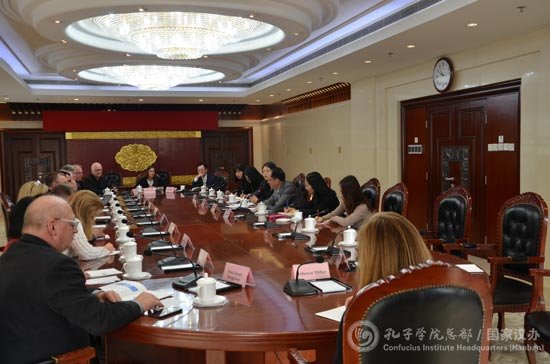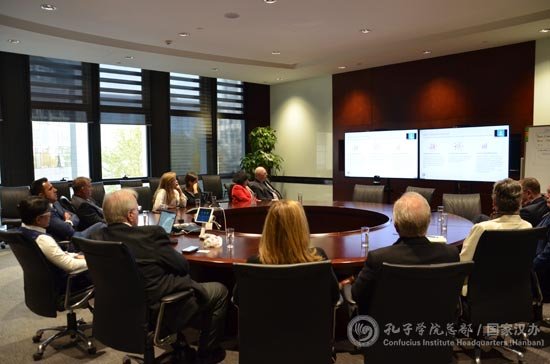The China-US International Education Delegation, at the invitation of the Confucius Institute Headquarters, visited the Ministry of Education in the morning of November 12th.

Fang Jun, Deputy Director-General of the Department of International Cooperation and Exchanges welcomed the delegation and expressed that exchanges in education are of great significance in strengthening the mutual understanding between China and US. Fang firstly introduced the situation and characteristics of Chinese education to the guests. He said that China’s education is featured with large scale, rapid development and unique cultural background. There are about 270 million students in China, around 35 million of which are college students. It is a very challenging job to meet educational needs with such a volume. In the past 40 years, especially in the past 10 years, Chinese education has experienced rapid development: only about 4% of Chinese students would go to college 37 years ago, while the percentage now is 42.7%. The current challenge of Chinese education is not to provide more access for students, but to improve the quality and fairness of education. During the discussion, Fang also noted differences in the education system between China and US and introduced the exchanges and cooperation between the two countries in the field of education, including the “Social and Cultural Dialogue” proposed on the basis of the meeting between the two heads of state in Mar-a-Lago. In addition, Fang discussed the cooperative school running pattern between the two countries. For example, Chinese colleges can provide credit courses to American students to attract more students to study in China. At present, there are more than 280 cooperative education projects between China and US. Last year, 182,000 Chinese students went to study in America, and the number of American students to China was 24,000. The demand for Chinese language teaching in US is buoyant, making the Confucius Institute a necessity in the local community. Fang also thanked the members of the delegation for their support in the past few years and expressed his hope to achieve mutual benefit and win-win outcomes in all fields through exchanges in education.
Matthew James Salmon, Vice President of Arizona State University, former congressman, and Chairman of Advisory Board of the Confucius Institute U.S. Center, expressed that China-US relation is one of the most important bilateral relations in the world. From climate change to world peace, as long as the two countries work together, all problems can be more easily solved. Therefore, the two countries, on sharing the common responsibility, need to focus on common grounds rather than differences as some western media outlets do, so as to enhance collaboration and make contributions to the benefit of the people.
He pointed out that the American people have a positive attitude toward China-US relation. And the members of the delegation support the constructive interaction between China and US and strongly endorsed the exchanges between the people. They hope that through exchanges, they can creatively strengthen bilateral relations and build stronger bounds in the education fields of China and US.
He expressed that the Confucius Institute at Arizona State University is regarded as one of the best China-US interactive exchange programs in the school. At present, there are hundreds of Confucius Institutes in US. This is a people-to-people exchange that promotes bilateral relations and mutual understanding, whose number is set to increase continuously. Meanwhile, he called on the Confucius Institute to strengthen communication with the public, invite government officials to visit the Confucius Institute, and further understand the significance of the Institute through its outstanding students.
Curtis Scott Bramble, President Pro Tempore of the Utah Senate was very supportive of the work of the Confucius Institute. He said that his positive attitude owes not just for being an American government official, but also the father of six children and grandfather– most of his children and grandchildren can speak Chinese.
He said that China and the US have different politics and government, that is neither good nor bad. He will continue to work hard to make his voice heard and support the development of the Confucius Institute.
Elia Dimayuga-Bruggeman, Assistant Commissioner of Education for Minnesota Department of Education, said that this was her first visit to China and she was deeply impressed. She agreed with what the others had talked in the meeting, and thought Chinese teaching is very important for Minnesota and US at large. In the 21st century, global education, including multiculturalism and multilingual teaching, will be conducive to enhancing mutual understanding and social development.
Patti Gartland, Chairman of the Greater St. Cloud Development Corporation, believed the visit is very instructive. As a business representative, she will continue to support the development of the Confucius Institute and is willing to help the business community to better understand the role of the Confucius Institute.
Frederick Thomas, the founder and CEO of US MHz Networks, said that the media they have run in the past few decades include many programs that promote mutual understanding between different cultures and countries, enabling them to come to know the Confucius Institute. He believed that the work of the Institute is long-term and lasting, while the work of the media (television) is to show what is behind the news headlines. A reasonable plan therefore is required to allow the media to play a role in supporting the development of the Confucius Institute.
The delegates also discussed issues of common interest between both sides. It is mentioned that during an event, Senator Orrin Hatch, President Pro Tempore of the US Senate, saw several Confucius Institute students—three children from the same family in elementary, middle, and high schools— speaking fluent Chinese. The senator highly appraised the projects of Hanban and said that it was exactly what Utah needs: to foster relations with China through language teaching to enhance political mutual trust with China. Harmony between the two countries requires not only the understanding of each other’s language, but also the enhancement of cultural exchanges, including cooperative education programs. After retiring from his political career, the senator intends to establish a foundation so as to contribute to China-US cultural exchange activities.

On the afternoon of the same day, the delegation visited the AIIB and discussed how to better provide financial support for distance education and new energy. (cited and source from Confucius Institute Headquarters)




